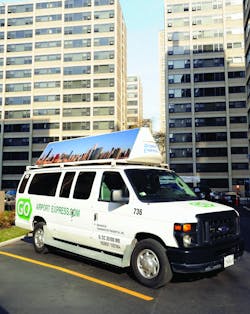For anyone who spends time getting to and from Chicago area airports, there is a chance you have been transported at some point by GO Airport Express. Founded in 1853 as a carriage service between train lines, the company now provides transportation services at O’Hare and Midway Airports.
GO Airport Express is now part of a large network of transportation providers offering services to more than 100 airports worldwide. In Chicago, the company operates 120 vehicles, making many short runs from the airports to downtown hotels in the Windy City.
With such a sizable operation, the run-up in fuel prices back in 2011 hit the bottom line hard. Few alternative vehicle options were available (running small, fuel-efficient sedans is not the most effective way to transport a large number of visitors to the city), so the company sought out alternative fuels.
“It’s been very difficult to increase our fares and keep our bottom line, so we’ve been really looking at ways to increase our margins,” says Robert Hann, vice president of marketing. “When money is tight, such as in a down economy, companies begin looking for alternative methods to protect their financial stability and future.”
That search led to a study of natural gas and propane autogas vehicles. According to Hann, important criteria included reducing the fleet’s carbon footprint and doing so without a negative impact on passenger comfort. Based on the return on investment, propane autogas was the preferred choice.
Working with Roush CleanTech, which designs, engineers, manufactures and installs propane autogas systems, GO Airport Express did express a few concerns, namely cold-weather operation and infrastructure.
“Being located in Chicago, we were concerned about cold-weather starting,” says Hann. “Roush CleanTech suggested we test drive various products. Our concerns about cold starts were eliminated with the autogas liquid injection technology.”
The company then reached out to a local propane retailer that helped install two 1,000-gal. onsite refueling stations.
With its concerns alleviated, GO Airport Express purchased 30 Ford E-Series vans in December of 2011, converting about half of its van fleet. According to Hann, the switch has even led to additional business.
“We survey our customers and [being green] seems to be very important to them,” he says. “Chicago is a big convention town, so when we’re marketing to conventions, that’s another feather we can tout—that we have a green fleet. I think the conventions appreciate that as they’re looking for ways to go green.”
Each shuttle is expected to travel about 300,000 mi. in its lifecycle. With about a 50% cut in fueling costs over gasoline, the company is seeing significant savings. It expects to reduce its carbon dioxide emissions by 3.1 million lbs. across the fleet’s useful life.
